Personnel note: Alabama’s Michael Schilleci elected to lead National Beer Wholesalers Association
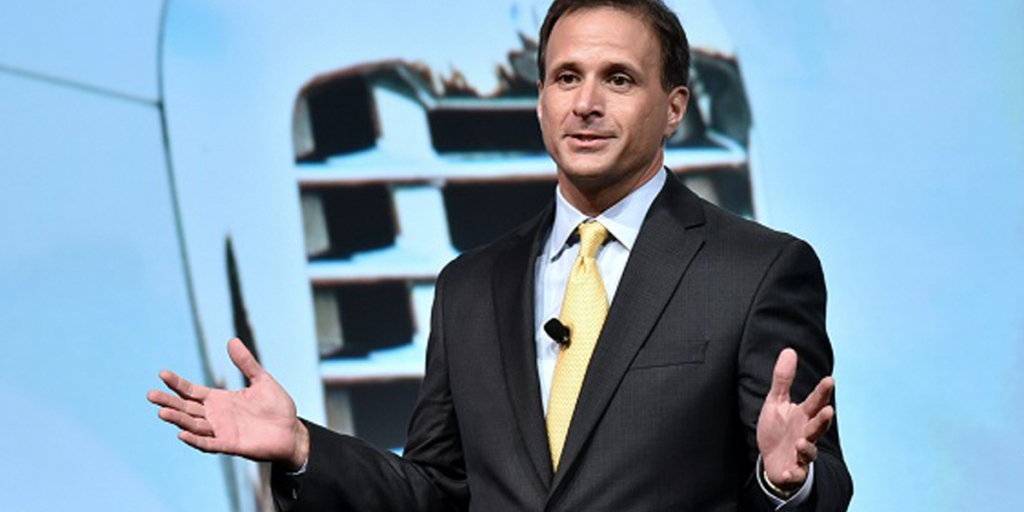
Alabama beer distributor Michael Schilleci has been elected Chairman of the National Beer Wholesalers Association (NBWA). In the role, he will lead the distribution industry’s national policy and advocacy efforts for the next year. Schilleci owns and operates North Alabama-based Supreme Beverage Company. Upon his election, he became the first Alabamian to ever chair the national organization. The Alabama Wholesale Beer Association (AWBA) is an active member of NBWA. Schilleci got involved with the NWBA through his involvement with the AWBA, which previously chaired. There he played a leading role in passing state legislation that eased outdated restrictions and allowed the craft brewing industry to grow in Alabama. Upon his election at the group’s convention in San Diego, Schilleci told his peers he wanted to use “strategic advocacy” to grow and protect the beer distribution industry. He also wants to keep a strong focus on the Beer Growth Initiative (BGI) in order to strengthen overall beer category health. As well as continue validating the beer industry’s independent distribution model. “I attended my first NBWA Convention when I was 23 years old, and I’ve had the privilege of witnessing the association fight tooth and nail on behalf of beer distributors across the country,” Schilleci said. “While we may face challenges over the next year, but I believe we are up to the task and am grateful for this incredible opportunity to serve.” Alabama Wholesale Beer Association Executive Director Donna Alexander said the state’s distributors are proud to have one of their own leading the group that helps wholesalers all over the country. “Michael has been such an integral part of AWBA’s growth over the last several years and we couldn’t be prouder to see him transcend to the national scene,” she said. “It’s a feather in the cap for our state, our industry, and our association.” NBWA advocacy Schilleci will drive the advocacy efforts for America’s 3,000 licensed, independent beer distributors and educate elected officials, regulators, the media and the public about the importance of effective state-based alcohol regulation and the regulatory, economic and commercial value of independent beer distributors. “Over his career, Michael has solidified himself as a leader in the beer distribution industry,” said Craig Purser, NBWA president and CEO. “His active involvement in NBWA and vast knowledge of the beer business make Michael a natural choice to guide the organization. We look forward to his leadership during this pivotal time in our industry.” Schilleci will also oversee “Delivering Local Jobs,” NBWA’s new public awareness campaign. The campaign shares the role beer distributors play in their communities, employing 135,000 people across the country and driving local economies. Alabama’s beer distributors support the jobs of more than 4,000 Alabamians.
GOP ramps up election-season warning of ‘toxic’ Dem tactics
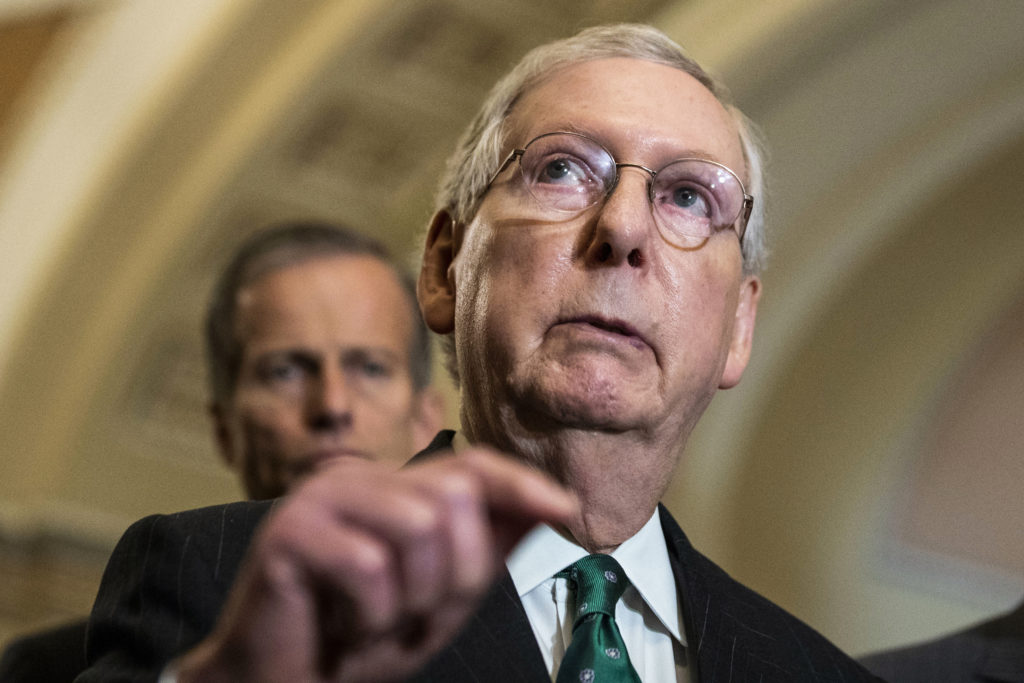
Senate Majority Leader Mitch McConnell bashed Democrats and their liberal allies Thursday for statements and actions that he dubbed “toxic fringe behavior,” sharpening Republicans’ campaign-season rhetoric as the party tries rousing conservative voters to turn out on Election Day. The Kentucky Republican’s remarks on the Senate floor were an extended version of a message party leaders have delivered since last week. That’s when the GOP began accusing Democrats of condoning “mob rule” after raucous demonstrators opposing Brett Kavanaugh‘s Supreme Court nomination harangued GOP lawmakers at the Capitol last week. Some Republicans said they received death threats. McConnell described protesters “literally storming the steps of the Capitol and the Supreme Court,” confronting Republicans at restaurants and shouting from the Senate visitors’ galleries during last week’s debate and vote on Kavanaugh. “Only one side was happy to play host to this toxic fringe behavior,” McConnell said. “Only one side’s leaders are now openly calling for more of it. They haven’t seen enough. They want more. And I’m afraid this is only Phase One of the meltdown.” He added: “We will not let mob behavior drown out all the Americans who want to legitimately participate in the policy-making process.” McConnell’s comments come less than four weeks from elections in which Democrats are seen as having a strong chance at capturing control of the House but weaker odds of winning a majority in the Senate. Until the rancorous debate over Kavanaugh — he denied accusations by three women of 1980s sexual misconduct — polls suggested that GOP supporters were far less motivated to vote than Democrats, who are ardently opposed to President Donald Trump. Republicans have said the rowdy opposition to Kavanaugh has given conservative voters a new enthusiasm. McConnell has called it a political gift. The GOP rhetorical offensive also represents a flipping of the recent script, in which Democrats have accused Trump of intensifying divisions with nationalistic and at times racist appeals to his conservative base and personal attacks on political enemies. Almost a decade ago, Democrats also assailed the Tea Party, grassroots conservatives who rallied against President Barack Obama‘s health care law and who angrily shouted down lawmakers at town hall meetings. On Thursday, McConnell cited recent statements by 2016 Democratic presidential candidate Hillary Clinton and former Attorney General Eric Holder. And he pointedly noted that these activities followed last year’s shooting of GOP lawmakers at a morning baseball practice by “a politically crazed gunman.” James Hodgkinson, who was killed at the scene by officers, was infuriated by President Donald Trump‘s election, his widow has said. Clinton said on CNN this week that “civility can start again” after Democrats capture the House or Senate in next month’s elections. In a video purportedly shot at a recent campaign event in Georgia, Holder says, “When they go low, we kick them,” paraphrasing former first lady Michelle Obama, who famously said during the 2016 campaign, “When they go low, you go high.” Republished with permission from the Associated Press.
Parker Snider: How to prepare for Russia’s October surprise

Russia is in the business of mind control. They’re not doing it through sinister headgear, satellite interference, or dream invasion like in Inception, though. Instead, Russia seeks to control the minds of Americans through something we all have and spend arguably too much time on: social media. This isn’t news to many of us. For years we’ve heard how Russia infiltrated Facebook and Twitter in an effort to divide our nation during the 2016 election. It seems, however, that Russia’s interference in our last presidential election wasn’t a “one-and-done” deal. Russia, reports suggest, is coming back for more. In a recent press conference at the White House, intelligence officers remarked that Russia is engaged in a “24/7, 365-days-a-year” campaign to influence the 2018 elections through various means, but especially though social media. Recent headlines confirm this reality. Just this summer, Facebook announced that it has shut down over thirty fake accounts that had over 300,000 followers each. Unfortunately, however, this may only be the tip of the iceberg. According to experts, there is 25 to 30 times more fake information from automated political accounts than real interaction between people on their platform. With the 2018 midterms only weeks away, current intelligence suggests that there will likely be an “October surprise” by the Russians in which they increase their misinformation campaigns to have the largest impact. In a recent interview with NPR, Matt Bruen, a former staffer with the National Security Council within the White House, stated, “It is not a question, in my mind, of whether it’s going to happen. It is a question only of when and how large.” Why, though, is Russia so intent on participating in our electoral process? In the editor’s letter to a recent edition of The Week magazine, Mark Gimein–who was born in Russia and whose family found refuge in the states–argues that Russia is driven by “the[ir] overarching ambition of undermining the moral standing of the U.S.” “What the Kremlin’s hackers most want to break into,” he continues, “isn’t voting machine software; it’s the democratic principles of tolerance and the peaceful transition of power.” Russia’s goal is not the election of a specific person or party to power. Instead, Russia wants to sow discord and anger in our ranks through misinformation. They hope to control how we think of our political opponents, with the goal that we will ultimately become our own worst enemy. Russia is in the business of mind control, but there’s good news: we can prepare. The best way to do that is not to eliminate social media from our lives, but to adopt a healthy level of skepticism towards political posts we see on those platforms. Before sharing anything, we each ought to do some basic research and see if any other news organizations are corroborating it. If not, it’s best to wait to see if the story is picked up by reputable news sources. Those inflammatory news stories that are not mentioned anywhere else are likely fake. The Russians are betting that we continue to believe everything we see on social media that lines up with our political views. They’re also hoping that we share it to our friends, and that they share it to their friends. A little fact-checking–even a simple Google search–could severely hamper their efforts. We can win this battle, and I am confident that we will. It may be a little less convenient, but it will ensure our democracy survives in the long-run. ••• Parker Snider is Policy Relations Manager for the Alabama Policy Institute (API). API is an independent, nonpartisan, nonprofit research and educational organization dedicated to strengthening free enterprise, defending limited government, and championing strong families. If you would like to speak with the author, please e-mail communications@alabamapolicy.org or call (205) 870-9900.
Alabama Community College System receives $1.75M federal ARC grant

The Alabama Community College System has been awarded an Appalachian Regional Commission (ARC) grant in the amount of $1,750,000, U.S. Senator Richard Shelby announced Thursday. This grant funding is a part of the Alabama Skills Training to Support Real Opportunities for New Growth (STRONG) project, which will target the coal-impacted communities in 10 counties in the state of Alabama. “Promoting workforce development is vital to the overall growth and development of our state,” said Shelby. “This ARC grant will provide opportunity for students interested in entering Alabama’s advanced manufacturing industry while also allowing businesses throughout our state to have increased access to a highly skilled workforce. I look forward to continuing to work with ARC and the Alabama Community College System to promote education and economic advancements.” The STRONG project seeks to increase awareness about the current and future job opportunities available in the advanced manufacturing sector, a growing part of the regional economy. It will provide students and workers with life skills, remedial education, and cutting-edge technical skills and training to prepare them for either additional postsecondary education or direct placement into high-wage and high-demand careers available in our state’s advanced manufacturing industry. Individual courses will be offered through Bevill State, Jefferson State, Lawson State, and Shelton State Community Colleges. The project will provide residents with the benefit of working in advanced manufacturing, and it will serve close to 4,200 participants and their families directly with critical life and technical skills gap training, new job opportunities, and access to vital social and financial services. The grant ensures at least 2,101 workers and trainees along with 976 students will obtain new or enhanced positions, 1,132 jobs will be retained, seven new jobs will be created and six new programs will be implemented. Overall, there will be 77 participating businesses involved in this project.
Vice President Mike Pence coming to Birmingham on Thursday
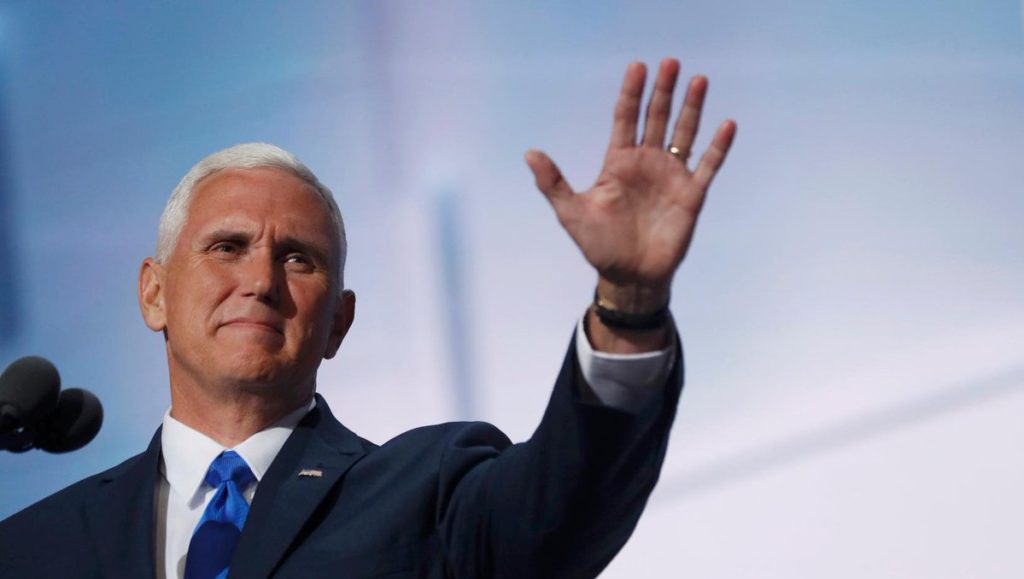
Vice President Mike Pence is planning to visit Georgia and Alabama on Thursday. The trip to Atlanta and Birmingham includes an appearance in support of Republican Brian Kemp‘s bid for Georgia governor. The White House says Pence will visit the Delta Airlines’ TechOps facility in Atlanta on Thursday to meet with employees and deliver remarks. Pence will then attend two political events, including a Georgia GOP fundraiser. Pence had been scheduled to come to Georgia last month but the event was cancelled because of Hurricane Florence. Pence headlined a rally for Kemp in July ahead of the Republican primary runoff. Kemp faces Democrat Stacey Abrams in next month’s general election Pence will then travel to Birmingham for a National Republican Senatorial Committee fundraiser. Republished with permission from the Associated Press.
Alliance for a Pro-Life Alabama names Cavanaugh, Lathan, McClurkin co-chairs
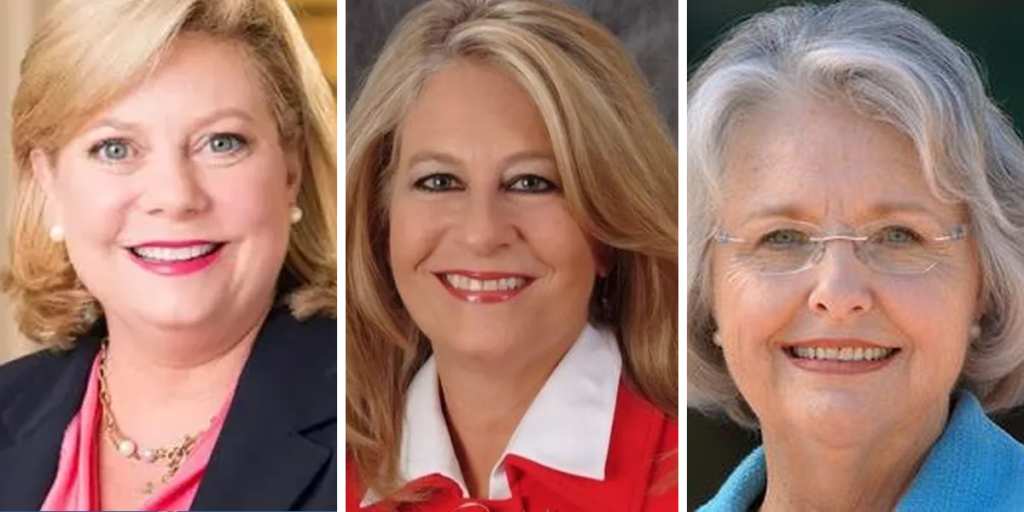
The Alliance for a Pro-Life Alabama — a group dedicated to fighting for the rights of the unborn and educating the public about Amendment Two — announced on Thursday that Public Service Commission President Twinkle Andress Cavanaugh, Alabama Republican Party Chair Terry Lathan, and former State Representative Mary Sue McClurkin have agreed to serve as co-chairs of the group and will help lead its efforts to pass Amendment Two on the November general election ballot. Cavanaugh was elected president of the Public Service Commission in 2012 and previously served as state chair of the Alabama Republican Party. “Alabama has the chance to lead the nation in protecting unborn life with successful passage of Amendment Two on November 6,” Cavanaugh said. “Amendment Two declares Alabama as a pro-life state and positions us to take action in the event that Roe v. Wade is overturned, which seems an increasing possibility with the confirmation of Justice Brett Kavanaugh.” Lathan, a former public-school teacher in Mobile, has served as chair of the Alabama Republican Party since being elected to the post in February of 2015. She and her husband, Jerry, were selected as the “Alabama Republicans of the Year” prior to her service as state party chair. “Planned Parenthood, the ACLU, the Feminist Majority Foundation, and other ultra-liberal groups are working to defeat Amendment Two and block Alabama’s opportunity to defend the unborn,” Lathan explained. “According to Secretary of State finance reports, out-of-state leftist groups have donated almost $1 million to the political action committee working against Amendment Two in order to preserve the abortion mill industry.” McClurkin served as a state representative from 1998 – 2014 and successfully passed several pro-life measures into law during her four terms in office. The Yellowhammer News political blog named her “one of the most ardently pro-life members of the Alabama legislature.” “The same liberal groups that attacked Justice Brett Kavanaugh and attempted to destroy his life have now turned their full attention toward Alabama and Amendment Two,” McClurkin added. “The choice is clear. Alabamians can side with unborn life and support Amendment Two, or they can side with Planned Parenthood, the ACLU and the abortion industry by voting against it. I’m standing strong for unborn babies.” Amendment 2 The Alabama Fair Ballot Commission explains the constitutional amendment, which was sponsored and passed by Montevallo-Republican, State Rep. Matt Fridy , with the following description: “Amendment 2 provides that it would be the public policy of the state to recognize and support the importance of unborn life and the rights of unborn children, including the right to life; and to protect the rights of unborn children. Additionally, the amendment would make clear that the state constitution does not include a right to abortion or require the funding of an abortion using public funds.”
Donald Trump prays for hurricane victims, criticizes Democrats
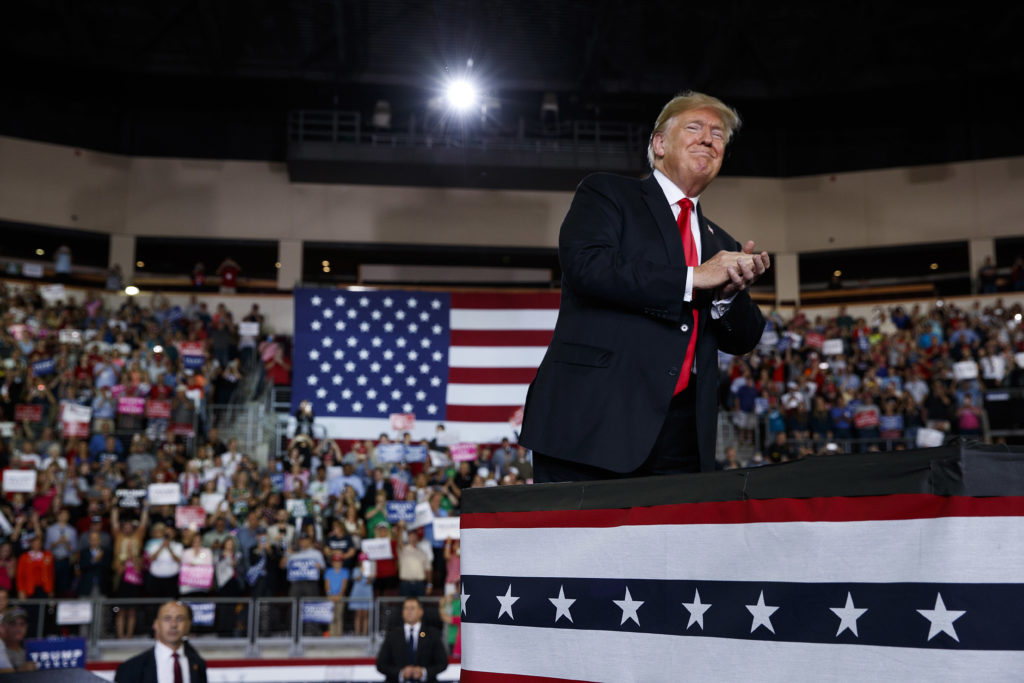
As Hurricane Michael pounded Florida, President Donald Trump took shelter at a campaign event in Pennsylvania, where he sought to boost Republicans before the midterms. Trump acknowledged the hurricane at the top of his rally Wednesday night in Erie, offering his “thoughts and prayers” to those in the storm’s path and promising to “spare no effort” in the response. He promised to travel to Florida “very shortly.” He added: “We will always pull through. … We will always be successful at what we do.” Then Trump turned back to politics. With weeks to go before the critical November elections, Trump and his fellow Republicans are engaged in an all-out midterms blitz. They have been invigorated by the successful nomination of Justice Brett Kavanaugh to the Supreme Court and are seeking to use the contentious moment to unify the GOP and stave off Democratic energy at the polls. That Trump kept his appointment in Erie underscored the importance of this effort to Republicans. Earlier in the day, Trump received a hurricane briefing at the White House on the Category 4 storm. He told reporters he faced a “quagmire” about whether to attend the Pennsylvania rally because “thousands of people” were already lined up for the event. He ultimately decided to attend, a move he criticized President Barack Obama for six years ago after Superstorm Sandy hit the East Coast. “Yesterday Obama campaigned with JayZ & Springsteen while Hurricane Sandy victims across NY & NJ are still decimated by Sandy. Wrong!” Trump tweeted on Nov. 6, 2012. On Wednesday, Trump touted two Republican congressmen, Mike Kelly and Lou Barletta. Kelly is facing a challenge from Democrat Ron DiNicola, while Barletta is mounting an uphill campaign to unseat two-term Democratic Sen. Bob Casey. The president, who attended a fundraiser before the rally, also praised GOP gubernatorial candidate Scott Wagner. Trump also celebrated Kavanaugh’s appointment amid Democratic opposition and sexual misconduct allegations against the nominee. Trump called it a “historic week,” saying, “What the radical Democrats did to Brett Kavanaugh and his beautiful family is a national disgrace.” For weeks, Trump has been escalating his attacks on Democrats. He continued that effort Wednesday, claiming that Democrats want to “impose socialism and take over and destroy American health care.” He added: “Democrats want to abolish America’s borders and allow drugs and gangs to pour into our country.” Trump also returned to one of his favorite themes — reliving his stunning 2016 victory. “Was that the most exciting evening?” he said to cheers. Trump also ticked through what he sees as his top achievements, including tax cuts and a new trade deal with Canada and Mexico. He talked about exiting the Iran nuclear deal and drew wild applause for mentioning his plans for a Space Force. Trump attacked Casey for opposing Kavanaugh’s nomination, saying he had “joined the left-wing mob.” He also accused Casey, named for his politician father, for “banking on the name of his father.” Trump’s own father, Fred, was a successful real estate developer who set his son up in business. The New York Times recently reported that Donald Trump received at least $413 million from his father over the decades, much of that through dubious tax dodges, including outright fraud. Earlier Wednesday, Trump published an op-ed in USA Today that attacked Democrats over “Medicare for All” health care proposals. In his op-ed, Trump said Democrats have moved away from centrism, claiming the “new Democrats are radical socialists who want to model America’s economy after Venezuela.” He added: “Government-run health care is just the beginning. Democrats are also pushing massive government control of education, private-sector businesses and other major sectors of the U.S. economy.” Trump’s attack on Medicare for All omits any mention of improved benefits for seniors that Democrats promise. Medicare for All means different things to different Democrats. The plan pushed by Sen. Bernie Sanders, the Vermont independent who challenged Hillary Clinton for the 2016 Democratic presidential nomination, would expand Medicare to cover almost everyone in the country, and current Medicare recipients would get improved benefits. Other Democratic plans would allow people to buy into a new government system modeled on Medicare, moving toward the goal of coverage for all while leaving private insurance in place. Democrats, who think health care is a winning issue going into the midterms, also sought to focus voter attention Wednesday. In the Senate, Democrats unsuccessfully sought to scuttle Trump’s push for short-term health insurance plans, which are less expensive but provide skimpier coverage. While the vote failed, Democrats think the move will help them in November. Republished with permission from the Associated Press.
Daniel Sutter: Rental scooters and innovation
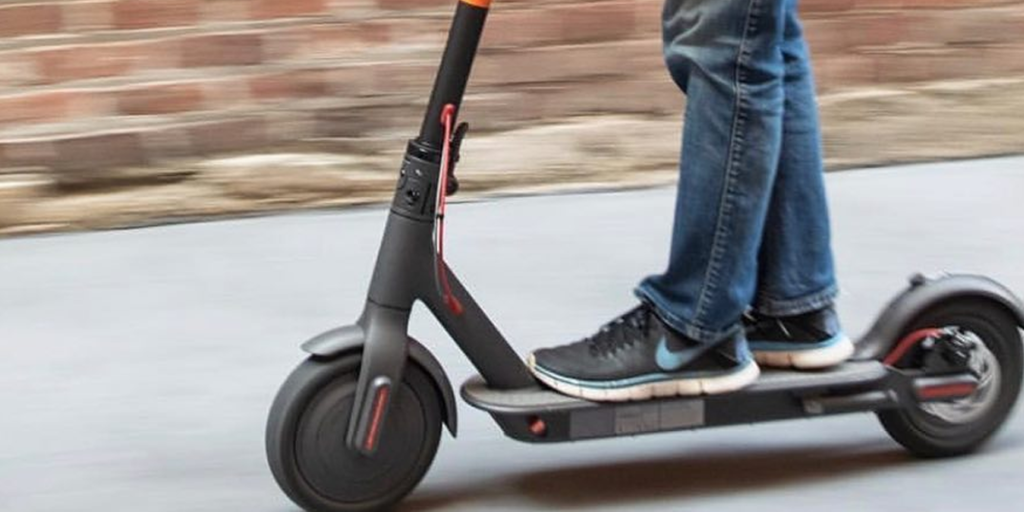
Rental bikes and scooters came to Troy University this fall, courtesy of the rental company Spin. Similar efforts by Spin, Bird, and Lime across the country, however, have met with controversy. The so-called “Scooter Wars” reflect how government permission affects innovation and growth. Technology makes such rentals, long available in resort locales, economical. The companies use GPS tracking and electronic billing, and rentals can be unlocked by scanning a driver’s license. People leave the bike or scooter at their destination and an app directs customers looking for a ride to the nearest rental. The companies use public spaces like sidewalks to “store” their rental units. This makes the rentals convenient for customers, as walking several blocks to and from rental locations would offset most of the time savings on short trips. Yet bikes and scooters clogging sidewalks have contributed to hostile reactions. Numerous cities have banned the scooter companies, including Miami (which banned Bird and Lime within weeks), Seattle, Boston, Nashville, and St. Paul. The bans have occurred in part because the companies entered some cities by just dropping off bikes and scooters on the streets for use. And Miami’s ban may not be permanent; Denver, Portland, and Salt Lake City all eventually permitted scooter rentals after initial bans. The government permission of relevance is more than simple business licenses, which are generally issued upon completion of required paperwork and payment of relevant fees. Instead, the permission requested here can be denied altogether. And this alters the prospects for innovation in our economy. Should scooter companies need permission slips from cities? This is where the “Scooter Wars” highlight an important tension. Are people free to do whatever the law does not prohibit? Or do we need permission from government to start new businesses, offer new products and services, or use our property as we wish? Rentals undoubtedly raise some valid concerns. Increased bike and scooter use can affect traffic safety. The rentals take up space on sidewalks, interfering with pedestrians. They could obstruct building entrances. Wouldn’t it be wise for city officials to evaluate the tradeoffs involved and impose rules to reduce potential problems? Yes, but unfortunately requiring government permission does not produce only wise and benign oversight. Government permission empowers a NIMBY, or Not in My Backyard, society. NIMBY becomes the default response when people can object to a new venture for any reason, good, bad, or imagined. Do you find scooters unsightly, annoying, or threatening? Then pressure city officials to ban them. Requiring government permission also allows economic interests to block competition. Economist Joseph Schumpeter described capitalism as a process of creative destruction: automobiles, cell phones, and email rendered horse-drawn buggies, landlines, and traditional mail largely obsolete. Existing businesses, often long-standing pillars of local economies and politics, have an interest in preventing innovation. If local governments must give permission, people’s natural NIMBY reaction and existing business’ interests create biases against innovation. The scooter companies resorted to surprise deployments as a means, I think, of counteracting government’s status quo bias. Miamians took 30,000 trips on Lime scooters while they were available, and these users also spoke to city officials. The ride sharing company Uber similarly sought to develop loyal local customers to fend off local political efforts to ban ridesharing. Progress requires innovation, even though the new and different can be frightening. Unfortunately, the need to get government permission becomes a formula for stasis, as Tyler Cowen examines in The Complacent Class. And dynamic innovation doesn’t mix well with permission. Computers and technology have been leading sources of innovation in recent decades in part because innovation here often still doesn’t require permission. Personally, I’m too uncoordinated to try to use an electric scooter. So don’t expect to see me on a Spin scooter soon. But regardless of your age or coordination level, the Scooter Wars’ clash between NIMBY and innovation matters for us all. ••• Daniel Sutter is the Charles G. Koch Professor of Economics with the Manuel H. Johnson Center for Political Economy at Troy University and host of Econversations on TrojanVision. The opinions expressed in this column are the author’s and do not necessarily reflect the views of Troy University.


